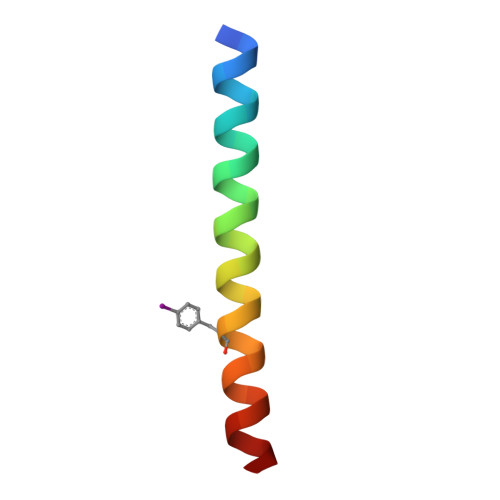A basis set of de novo coiled-coil Peptide oligomers for rational protein design and synthetic biology.
Fletcher, J.M., Boyle, A.L., Bruning, M., Bartlett, G.J., Vincent, T.L., Zaccai, N.R., Armstrong, C.T., Bromley, E.H., Booth, P.J., Brady, R.L., Thomson, A.R., Woolfson, D.N.(2012) ACS Synth Biol 1: 240-250
- PubMed: 23651206
- DOI: https://doi.org/10.1021/sb300028q
- Primary Citation of Related Structures:
4DZK, 4DZL, 4DZM, 4DZN - PubMed Abstract:
Protein engineering, chemical biology, and synthetic biology would benefit from toolkits of peptide and protein components that could be exchanged reliably between systems while maintaining their structural and functional integrity. Ideally, such components should be highly defined and predictable in all respects of sequence, structure, stability, interactions, and function. To establish one such toolkit, here we present a basis set of de novo designed α-helical coiled-coil peptides that adopt defined and well-characterized parallel dimeric, trimeric, and tetrameric states. The designs are based on sequence-to-structure relationships both from the literature and analysis of a database of known coiled-coil X-ray crystal structures. These give foreground sequences to specify the targeted oligomer state. A key feature of the design process is that sequence positions outside of these sites are considered non-essential for structural specificity; as such, they are referred to as the background, are kept non-descript, and are available for mutation as required later. Synthetic peptides were characterized in solution by circular-dichroism spectroscopy and analytical ultracentrifugation, and their structures were determined by X-ray crystallography. Intriguingly, a hitherto widely used empirical rule-of-thumb for coiled-coil dimer specification does not hold in the designed system. However, the desired oligomeric state is achieved by database-informed redesign of that particular foreground and confirmed experimentally. We envisage that the basis set will be of use in directing and controlling protein assembly, with potential applications in chemical and synthetic biology. To help with such endeavors, we introduce Pcomp, an on-line registry of peptide components for protein-design and synthetic-biology applications.
- School of Chemistry, University of Bristol, Cantocks Close, Bristol BS8 1TS, UK.
Organizational Affiliation:

















